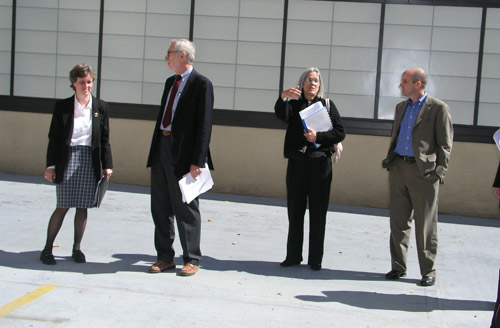Federal buildings board: Agencies can save billions by shedding ‘vastly underutilized’ office space
GSA has sold 10 of a dozen properties on PBRB’s list of high-value recommendations, and expects to sell another property by the end of July.
An independent board created by Congress finds agencies are sitting on more real estate than they need, and could recover billions of dollars by selling off excess space.
Members of the Public Buildings Reform Board say agencies have a unique opportunity to offload some of their excess space, if hybrid work is here to stay for federal employees.
“The board views this current reality as an extraordinary, once-in-a-lifetime opportunity for the government to right-size its portfolio,” Paul Walden, the board’s executive director, said at a PBRB meeting last Thursday.
But time is running out. The board, under the FASTA legislation, is scheduled to disband by May 2025.
“The clock is ticking against us,” Walden said.
Lawmakers are looking to extend the board’s tenure through the end of 2026 and give it additional authority. But none of those bills are close to passing.
Dan Mathews, former commissioner of GSA’s Public Buildings Service and the PBRB’s newest member, said the COVID-19 pandemic’s impact means federal buildings are even more underutilized than when the board first started its work.
“Congress got frustrated that they saw a need for disposals, yet nothing was going through the process — or almost nothing — in respect to the need. And that problem is, in a way, worse now, because there’s so much more need,” Mathews said.
GSA has sold 10 of a dozen properties on PBRB’s list of high-value recommendations, and expects to sell another property by the end of July.
Former Rep. Nick Rahall (D-W.Va.), another member of the PBRB, said the board has had some “tremendous successes,” but still has a lot of work ahead of it.
“Today, it appears that much of the status quo has not changed,” Rahall said. “We have problems getting information, we have problems with a lot of the agencies and trying to convince them to really relocate or consolidate. But we’re going to do it — we’re going to get our work done.”
Board members see plenty of opportunities to sell underutilized office space in major cities across the country.
PBRB is looking at 27 high-value federal properties in cities with a strong federal presence. Those include D.C., Boston, Atlanta, Miami and Los Angeles.
The board finds most of this 11 million square feet of federal office space is underutilized, and that agencies could save billions of dollars in the long term by eliminating about 60% of this space.
If agencies got rid of nearly 7 million square feet of excess office space in these major metro areas, board expects that could save more than $3 billion over the next 30 years.
Walden says those savings include the sale of excess properties, as well as eliminating operating costs and maintenance of older, non-historic properties.
“We have all these buildings that are vastly underutilized, and the operating expenses are extraordinary, if you look at it on a per-person cost,” he said. “If you did some disposals and some consolidations, the savings are astronomical.”
Walden said the board’s analysis of these 27 federal properties isn’t part of any of its final recommendations and is currently a “hypothetical scenario.”
He also said the board isn’t looking at relocating federal employees out of the cities where they’re already working.
PBRB member David Winstead, another former PBS commissioner, said part of the problem is the federal portfolio is larger than what GSA can pay to keep in good working order.
That leads to office conditions that federal employees don’t want to work in.
“It’s a huge cost to the taxpayer to maintain these buildings that are no longer competent to be competitive, nice workspaces for federal employees. Many of the major historic ones we need to keep, and I think the board’s committed to that,” Winstead said.
GSA-owned buildings are, on average, over 50 years old, and showing their age. The agency is dealing with a multi-billion-dollar maintenance backlog.
Mathews says this problem is particularly apparent in downtown D.C.
“If we walked down Independence Avenue together, I’d point out over $4 billion worth of liabilities in the owned buildings before we get to the end of the street,” Mathews said. “That’s just in one street in one city.”
Another problem is that federal agencies don’t always want to relocate.
“We’re hearing from federal agencies that don’t want to move,” Winstead said. “GSA is still getting resistance from those agencies. Whether their names are on the building or not, it is not defensible for them to take a position like that now.”
Former Rep. Mike Capuano (D-Mass.), another PBRB member, said the board understands it’s not always easy to convince agencies to move.
“There is a debate right now as to whether GSA has the legal authority to require agencies to move. Some people say they do, GSA says it doesn’t,” Capuano said. “That’s one thing we should clarify whether they do or they don’t.”
The board is scheduled to submit its final round of recommendations to the Office of Management and Budget in December.
Walden says the board’s work has generated “quite a lot of interest” from lawmakers. PBRB members have briefed House and Senate committee members about a dozen times since this spring.
Walden says the board also recently convened a roundtable with commercial real estate to discuss the next steps.
“What do you think needs to happen going forward to effect change? Do you need to stand up a new commission? Do you need to give PBRB more authority, GSA more authority, OMB more authority? What needs to happen? What can we tell Congress to affect this transformation going forward?” he said.
Lawmakers are pressing agencies on underutilized space.
That’s because the Government Accountability Office found last summer that all agency headquarters buildings in the Washington, D.C. area had excess space, including 17 that had an average building utilization of just 25%.
PBRB went one step further. It estimates federal headquarters buildings operated at 12% of their estimated capacity, on average, between January and September 2023.
Mathews says agencies can’t justify having that much space, and not putting it to good use.
“What’s happening now is a completely indefensible amount of money is being spent on quantity of real estate, and quality is absolutely horrible,” Mathews said. “I don’t blame our federal employees who never want to come back into the office.
“It’s just the same thing over and over and over again. They’re empty, they have capital liabilities that are so far beyond the available resources,” he added. “There is no economic path forward for those buildings, period, bar none. So why aren’t we seeing more properties through the normal disposal process?”
Since 2020, GSA has shed about 8 million square feet of office space. It now oversees about 371 million square feet of federal real estate.
Elliot Doomes, the current commissioner of GSA’s Public Buildings Service, recently told members of the Senate Environment and Public Works Committee that GSA can deliver on their demands to sell or dispose of underutilized federal buildings.
That’s as long as Congress approves funds meant to relocate federal employees to new office space.
“We’re going to have to spend some money in order to save some money,” he said.
GSA is asking Congress for a $425 million “optimization” fund in next year’s budget. The funding would help agencies move out of underutilized office space.
Doomes said this funding proposal would help GSA improve building utilization.
“Although it’s agency by agency, I’ll tell you, the trend is agencies are giving up space. They understand,” Doomes told lawmakers. “We’re bringing our workspace experts to work with these agencies to say, ‘How often are people there? What kind of work do you do? Maybe you don’t need all that space.’ Let’s give some of that space back,” Doomes said.
Copyright © 2025 Federal News Network. All rights reserved. This website is not intended for users located within the European Economic Area.
Jory Heckman is a reporter at Federal News Network covering U.S. Postal Service, IRS, big data and technology issues.
Follow @jheckmanWFED





